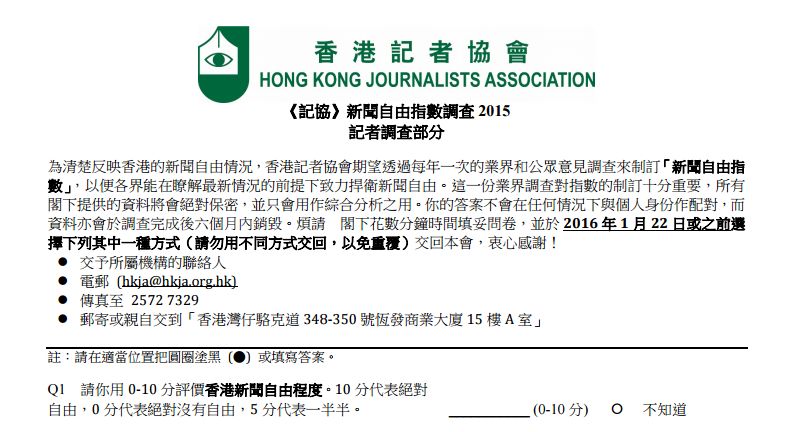Press freedom in Hong Kong has declined for the second year in a row, with both the public and journalists believing that it deteriorated in 2015, a study by the Hong Kong Journalist Association (HKJA) has found.

Although the survey only began in 2013, the index is currently at its lowest, dropping 1.4 points to 47.4 for the general public and 0.7 points to 38.2 for journalists compared to the previous year. A total of 54 percent of public respondents and 85 percent of journalists believed that it has declined.
According to HKJA Chairperson Sham Yee-lan, journalists are usually more sensitive towards such changes but, when the public rating also falls, it shows an increased awareness of the problem.
The survey was conducted in conjunction with the University of Hong Kong Public Opinion Programme (HKUPOP), which interviewed a total of 1,021 Cantonese-speaking Hong Kong adults between January 14 and 19. Questionnaires were also received from 446 journalists.
‘Self-censorship’ increases
It was also found that journalists and the general public are of the view that self-censorship has become more common, with both groups believing that media outlets are concerned about criticising the central government in Beijing.

Many also reacted negatively to the purchase of English-language daily The South China Morning Post by Chinese e-commerce conglomerate Alibaba with 88 percent of journalists and 57 percent of the public believing that the buy-out threatened press freedom.
An overwhelming 97.7 percent of journalists also believed that the failure to prosecute those who attacked reporters during the pro-democracy Occupy protests in 2014 harmed press freedom, while over 97.1 percent said the government’s release of information at inappropriate times or through inappropriate channels was detrimental.
More than 94 percent of journalists also believed not allowing online media to attend government press conferences was harmful to the freedom of the press.

Sham called for the government to introduce a Freedom of Information Act as soon as possible.
“That existing laws are insufficient to allow journalists to obtain the information they needed for reporting also renders undesirable effects on press freedom. With 10 being very adequate and 0 being very inadequate, the average rate for the public is 5.7 and for journalists 4.4, further 0.1 and 0.2 down from 2014 respectively,” the HKJA observed.
Sham said that press freedom was pillar of Hong Kong’s success, but it had been “eroded at its roots”, and was an indication that fundamental rights enjoyed by the public were being encroached upon. She urged the government to do more to safeguard press freedom, a right guaranteed under the Basic Law.
